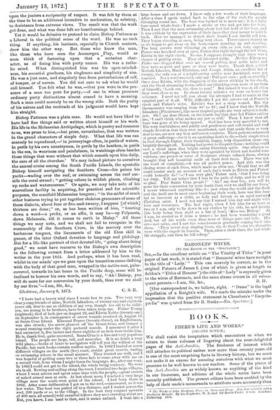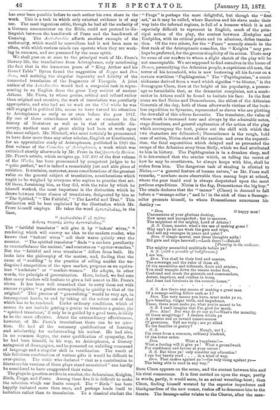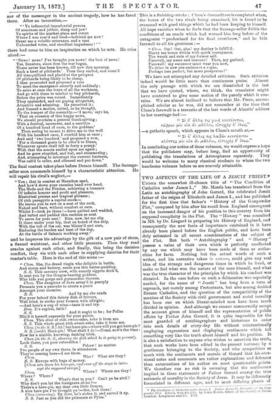BOOKS.
FRERE'S LIFE AND WORKS.*
[SECOND NOTICE.)
WE shall resist the temptation which encounters us when we return to these volumes of lingering about the ever-delightful pages of the Anti-Jacobin. The freshness of interest which still attaches to political satires now more than seventy years old is one of the most surprising facts in literary history, but we must not make it an excuse for amusing ourselves with what we must presume to be well known to our readers. Some of the pieces of the Anti-Jacobin are as widely known as anything of the kind in our literature, and editions of the whole series have been recently published. The present editors have been enabled by the help of their uncle's memoranda to attribute more accurately than • The Works of John Hookharn Frere. in Vine and Prose. Now first collected, with a Prefatory Memoir. By his Nephews, W. E. and Sir Bartle Frere. 2 cols. London: Pickering. 1811. has ever been possible before to each author his own share in the work. This is a task in which only external evidence is of any use. The most ingenious critic, though he had all the audacity of a German commentator on the Bible, could not pretend to dis- tinguish between the handiwork of Frere and the handiwork of Canning. The Anti-Jacobin affords another example of the uniformity, which would be marvellous had it not been seen so often, with which various minds can operate when they are work- ing in common, and are possessed by the same spirit.
We shall pass on at once to the principal work of Mr. Frere's
literary life, the translations from Aristophanes, only mentioning the fact that in the humorous poem of "King Arthur and his Round Table" Byron found the suggestion of Beppo and Don Juan, and noticing the singular ingenuity and felicity of the connected translation of the fragments of Theognis. A joint author of the Anti-Jacobin would find a congenial task in repre- senting in an English dress the great Tory satirist of ancient Athens. Mr. Frere, to whose genius, critical and refined rather than original and creative, the work of translation was peculiarly appropriate, and who had set to work on the Cid while he was still engaged in political life, seems to have turned his attention to Aristophanes as early as or even before the year 1817. By one of those coincidences which are so common in the history of literature as well as in that of scientific dis- covery, another man of great ability had been at work upon the same subject. Mr. Mitchell, who must certainly be pronounced to have done more than any other scholar, English or Continental, for an appreciative study of Aristophanes, published in 1820 the first volume of the Comedies of Aristophanes, a work which was criticized shortly afterwards by Mr. Frere in the Quarterly Review. Mr. Frere's article, which occupies pp. 167-200 of the first volume of the TVorks, has been pronounced by competent judges to be "quite perfect," and is indeed a remarkably just and able piece of criticism. It contains, moreover, some considerations of the greatest value on the general subject of translation, considerations which ought to be weighed by everyone who aspires to practise that art. Of these, furnishing him, as they did, with the rules by which he himself worked, the most important is the distinction which he draws between three classes of translators, designated by him as "The Spirited," "The Faithful," "The Lawful and True." This distinction will be best explained by the illustration which Mr. Frere himself employs. He takes the word ciprvrtagIcce, in the lines, ciPtIpac ,:roins-ci; ;6c:1p cifizoqrcaida.;."
The "faithful translator" will give it by "bakers' wives," a rendering which will convey no idea to the modern reader, who knows that "bakers' wives" sell their wares quietly over the counter. "The spirited translator" finds "a modern peculiarity to counterbalance the ancient," and ventures on "oyster-wenches." But the "faithful and true translator" differs from both. He looks into the philosophy of the matter, and, finding that the cause of " scolding " is the practice of selling amidst the un- disguised competition of the open market, proposes as an equiva- lent " hucksters " or "market-women." He adopts, in other words, the principle of generalization. Here, indeed, we feel sure that many readers will hesitate to give a full assent to Mr. Frere's views. It has been well remarked that to carry them out with success requires" a genius corresponding in quality to that of the original." This process of " generalizing " would be very apt, in incompetent hands, to end by taking all the colour out of that which has to be rendered. Under ordinary conditions, which of course do not include getting a genius to translate a genius, the "spirited translator," if only he is guided by a good taste, is likely to be the most effective. About the extraordinary effectiveness, however, of Mr. Frere's translations there can be no ques- tion. He had all the necessary qualifications of learning and scholarship for understanding his author. He had also, in no cammon degree, the rarer qualification of sympathy, for he had been himself, in his way, an Aristophanes, a literary antagonist of demagogues, and he possessed an unfailing command of language and a singular skill in versification. The result of this felicitous combination of various gifts it would be difficult to over-praise. The critic who declared " that as a contribution to literature his versions of these plays stand unmatched" can hardly be considered to have exaggerated their value.
The plays in question are five in number, the Acharnians, Knights, Birds, Frogs, and Peace. Among these five it is difficult to make the selection which our limits compel. The " Birds " has been happily imitated more than once, and perhaps lends itself to imitation rather than to translation. To a classical student the
"Frogs" is perhaps the most delightful, but though the " first- act," as it may be called, where Bacchus and his slave make their way into the infernal regions, is full of a humour which it is not especially difficult to represent in English, much of the prin- cipal action of the play, the contest between Mschylus and Euripides, with its critical points and its allusions, defies transla- tion. Of the two others, for the " Peace " scarcely stands in the first rank of the Aristophanic comedies, the " Knights " may per- haps be preferred, for the greater simplicity of its action. There may be some of our readers to whom a slight sketch of the play will be not unacceptable. We are supposed to find ourselves in the house of Demos, personifying the Athenian people, a capricious old man, the- terror of his household, who is now bestowing all his favour on a certain worthless "Paphlagonian." The "Paphlagonian," a comic nickname derived from a word which signifies "to bluster," is the demagogue Cleon, then at the height of his popularity, a person- age so formidable that, as the dramatist complains, not a mask- maker in Athens could be found to imitate his face. In the first scene we find Nicias and Deruosthenes, the ablest of the Athenian Generalsof the day, both of them afterwards victims of the luck- less expedition to Syracuse, represented as slaves who are plotting the downfall of this odious favourite. The translator, the value of whose work is increased here and always by the admirable notes, stage directions, and general explanation of the action of the play which accompany the text, points out the skill with which the two characters are delineated ; Demosthenes is the rough, bold man of action, Nicias shows all the caution and even the supersti- tion, the fatal superstition which delayed and so prevented the- escape of the Athenian army from Sicily, which we find attributed. to him in history. The Paphlagonian is in a drunken sleep, and it is determined that the oracles which, as telling the secret of how he may be overthrown, he always keeps with hlin, shall be stolen from him. The dangerous task of stealing is allotted to Nicias,—" a general feature of human nature," as Mr. Frere well remarks, "nowhere more observable than among boys at school, where the poor timid soul is always despatched upon the most perilous expeditions. Nicias is the fag, Demosthenes the big boy." The oracle declares that the " tanner " (Cleon) is doomed to fall before a " sausage-seller ; " and lo ! in the nick of time a Sausage- seller presents himself, to whom Demosthenes announces his• deaths y " Dem. 0 happy man!
Unconscious of your glorious destiny, Now mean and unregarded ; but to-morrow, The mightiest of the mighty, Lord of Athens
S. S. Come, master, what's the use of making game ?
Why can't ye let me wash the gate and tripe, And sell my sausages in peace and quiet ?
Dem. 0 simple mortal, cast those thoughts aside !
Bid guts and tripe farewell ;—Look there !—Behold
[Pointing to the audience.
Themighty assembled multitude before ye !
S. S. (with a grumble of indiference.) I see 'em.
Dem. You shall be their lord and master,
The sovereign and the ruler of them all, Of the assemblies and tribunals, fleets and armies ; You shall trample down the senate under foot, Confound and crush the generals and commanders, Arrest, imprison, and confine in irons, And feast and fornicate in the council-house."
S. S. Are there any means of making a great man
Of a sausage-selling fellow such as I?
Dem. The very means you have, must make ye so,
Low-breeding, vulgar birth, and impudence, These, these must make ye, what you're meant to be.
S. S. I can't imagine that I'm good for much.
Dem. Alas! But why do ye say so ?—What's the meaning,
Of these misgivings ? I discern within ye A promise and an inward consciousness Of greatness. Tell me truly ; are ye allied To the families of gentry?
S. S. Naugb, not I; I'm come from a common, ordinary kindred, Of the lower order.
Dem. What a happiness !—
What a footing will it give ye ! What a groundwork For confidence and favour at your outset !
S. S. But bless ye! only consider my education !
I can but barely read . . . . in a kind of way.
Dem. That makes against ye !—the only thing against ye—
The being able to read in any way."
Soon Cleon appears on the scene, and the contest between him and his rival commences. It is first carried on upon the stage, partly in words, partly, it would seem, in an actual wrestling-boat; then Cleon, finding himself worsted by the superior impudence and blackguardism of the new comer, rushes off to denounce him to the Senate. The Sausage-seller relates to the Chorus, after the man- ser of the messenger in the ancient tragedy, how he has fared there. After an invocation,—
" Ye influential impu.dential powers Of sauciness and jabber, slang and jaw ! Ye spirits of the market-place and street Where I was rear'd and bred—befriend me now ! Grant me a voluble utterance, and a vast Unbounded voice, and steadfast impudence ! ' " there had come to him an inspiration on which he acts. He cries aloud :— " 'News! news ! I've brought you news! the best of news!
Yes, Senators, since first the war began, There never has been known, till now this morning,
Such a bawl of pilchards.' Then they smiled, and seem'd
All tranquillized and placid at the prospect Of pilchards being likely to be cheap.
I then proceeded and proposed a vote To meet the emergence secretly and suddenly; To seize at once the trays of all the workmen, And go with them to market to buy pilchards, Before the price was raised. Immediately They applauded, and sat gaping altogether, Attentive and admiring. He perceived it ; And framed a motion, suited, as he thought, To the temper of the assembly.—' I move,' says he, That on occasion of this happy news, We should proclaim a general thanksgiving ; With a festival, moreover, and a sacrifice Of a hundred head of oxen, to the goddess.'
Then seeing he meant to drive me to the wall With his hundred oxen I overbid him at once ;
And said 'two hundred,' and proposed a vow,
'For a thousand goats to be offer'd to Diana,
Whenever sprats shall fall to forty a penny.'
With that the senate smiled upon me again ; And he grew sttipified, and lost, and stammering ; And, attempting to interrupt the current business, Was call'd to order, and silenced and put down."
The final contest takes place before Demos himself. The Sausage- seller soon commends himself by a characteristic attention. He will repair his rival's neglect,—
" You ; that in combat at Marathon sped,
And hew'd down your enemies hand over head, The Made and the Persian, achieving a treasure Of infinite honour and profit and pleasure, Rhetorical praises and tragical phrases ;
Of rich panegyric a capital stock—
He leaves you to rest on a seat of the rock, Naked and bare, without comfort or care.
Whilst I—look ye there !—have quilted and wadded, And tufted and padded this cushion so neat To serve for your seat ! Rise, now, let me slip It there under your hip, that on board of the ship.
With the toil of the oar, was blister'd and sore, Enduring the burden and heat of the day, At the battle of Salamis working away.'
snd he improves his advantage by the gift of a new pair of shoes, a flannel waistcoat, and other little presents. Then they read oracles against each other, and finally, this being the decisive conflict, they vie with each other in supplying dainties for their master's table. Here is the end of this scene :— " Cleon. She, the dread virgin who delights in battle, And storm and battery, sends you this batter-pudding. a S. This savoury stew, with comely sippets deck'd, Is sent you by the Gorgon-bearing goddess,
'Who bids you gorge and gormandize thereon.
C/eon. The daughter of Jove array'd in panoply Presents you a pancake to create a panic
Amongst your enemies.
S. S. And by me she sends For your behoof this dainty dish of fritters, Well fried, to strike your foemen with affright ; —And here's a cup of wine—taste it and try.
Dem. It's capital, faith ! S. S. And it ought to be ; for Pallas
Med it herself expressly for your palate.
Clem. This slice of rich sweet-cake, take it from me.
S. S. This whole great rich sweet-cake, take it from me. C/eon. (to the S. S.) Ah ! but hare-pie—where will you get hare-pie? S. S. (aside) Hare-pie ! What shall I do !—Come, now'a the time :
Now for a nimble, knowing, dashing trick.
Cl-eon (to the S. S., showing the dish which he is going to present).
Look there, you poor rabscallion !
S. S. Pshaw ! no matter. I've people of my own there, in attendance. 'They're coming here—I see them. Cleon. Who ? What are they ? S. S. Envoys with bags of money.
[Clem: sets down his hare-pie, and runs off the stage to inter- cept the supposed envoys.]
Cleun. Where ? Where are they ? 'Where ? Where?
S. S. What's that to you ? Can't ye be civil ? Why don't you let the foreigners alone ?—
There's a hare-pie, my dear own little Demus,
A nice hare-pie I've brought ye !—See, look there ! C/eon (returning). By Jove, he's stolen it, and served it up. S. S. Just as you did the prisoners at Pyles." This is a finishing-stroke ; Cleon's discomfiture is completed when, the boxes of the two rivals being examined, his is found to be crammed with good things which he had been keeping to himself. All hope vanishes when he finds that the Sausage-seller fulfils the conditions of an oracle which had warned him long before of the antagonist "predestined for his final overthrow," and he bids farewell to all his greatness Cleon. Oat! Out, alas! my destiny is falfill'd
Hurry me hence within with quick conveyance, The wreck and ruin of my former self.
Farewell, my name and honours! Thou, my garland, Farewell! my successor must wear you now, To shine in new pre-eminence a rogue, Perhaps less perfect, but more prosperous!"
We have not attempted any detailed criticism. Such criticism indeed would be little more than continuous praise. Almost the only passage with which we are dissatisfied is the last that we have quoted, where, we think, the translator might have contrived to give some notion of the parody which it con- tains. We are almost inclined to believe that Mr. Frere, accom- plished scholar as he was, did not remember at the time that Cleon's farewell is a travestie of the last words of Alcestis' address to her marriage-bed :—
" 1i 8' ii7Am vs; 7uvi xexriorai, crt6ppon ,wiv am, /iv pOi?■Xov, E5ruxii; S' iew;," —a pathetic speech, which appears in Cleon's mouth as,— " d' litxX4 ri Xagoir X.EZT426ErCet xXic-rn;,uiv ant iiv ihEiXXor, sLrir,vi; lett..);."
In concluding our notice of these volumes, we would express a hope that the publishers may, before long, find an opportunity of publishing the translations of Aristophanea separately. They would be welcome to many classical students to whom the two handsome volumes before us are scarcely attainable.




































 Previous page
Previous page